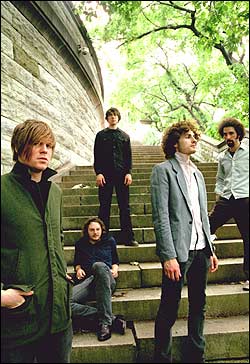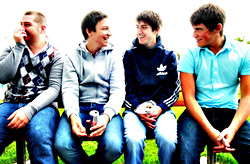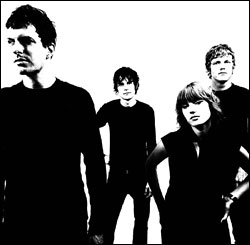Something about the Fever’s Red Bedroom (Kemado) smelled fishy from the get-go—not just the ink on the digipak, either. The Fever’s first full-length release bristled with contradictions so tightly wound that even string theory, with its kinky, nine-dimensional proviso, couldn’t unravel them. As the Lego-funk intro of opening song “Cold Blooded” lurched gracefully out of my office speakers for the 72nd time in as many hours, I found myself wondering why Ma Nature hadn’t put an APB out on them as soon as the label started sending out promos.
Maybe she was stymied, too. The conventional wisdom—that the New York quintet are retro-revisionist kin of the Rapture and Electric Six—sheds precious little light on the album’s mystery. Ditto for the dance-punk label they’d been saddled with ever since the release of their debut EP, Pink on Pink, last year. None of it was necessarily wrong, but there was more to them than that.
But what? Unanswered questions were piling up faster than bad checks in January, leaving me no closer to cracking the case. All the listening and ruminating had yielded nothing except for the calluses rimming my eardrums and a couple of observations, the first being that the band could have just as easily called the album The Sacking of Albion. Not only did singer Geremy Jasper get away with an English accent, he and guitarist (and principal songwriting partner) Sanchez Esquire made liberal use of a highly methamphetamine-led strain of Supergrass’ patented panache. Also, Jasper’s ongoing obsession with sex and death smacked mightily of Pulp frontman Jarvis Cocker, except that the former learned to sing before he started making records. Plus, unlike homme fatale Cocker, Jasper consistently cast himself as victim. “Dug up her past lives with the switchbade knife/That her phantom hand has planted in the back of my mind/My veins are runnin’/Cold-blooded,” he yelps lasciviously, just before shifting into a chorus that, mysteriously, felt like ska despite the fact that it had none of its obvious attributes.
Wait, I thought—this isn’t the only implied ska on the album. Finally, a clue! I emptied my pipe and grabbed the weathered Gladstone bag on the desk before me, already filled with my detective gear. Just before I reached the door, the deerstalker cap and magnifying glass I’d inherited from my renowned great-great-grandfather, Sherlock Smith, caught my eye. What the hey, I thought—for luck. Besides, it was raining; at least the hat would keep my head dry. I was off to see the wizard—sort of.
“This is not ska, either,” Dr. Skankenstein croaked, slumping deeper into his chair. I was getting exasperated. Here I’d taken a cab all the way to Vienna’s International Institute of Skatological Research, only to get shot down on “Cold Blooded” and “Ladyfingers” in seconds. True, the old buzzard was the most respected name in his field, discoverer of skambo, sklezmer, skango, and a slew of other exotic hybrids. But that had been back when the Mighty Mighty Bosstones were still working the big rooms. Plus, even with the comic value of his porkpie hat and too-tight ’60s sharkskin suit, the doctor had considerably less charm than the north end of a southbound millipede. “Take it off immediately,” he commanded. “Using the bass line to emphasize the ‘up’ eighth notes is blasphemy. It’s making me nauseous.”
The black-and-white checkerboard pattern that covered every surface in his office was having a similar effect on me. “Tell me, doc,” I asked, suspecting that I’d be out after one more strike. “Do you have a skasmograph here?”
He hunched forward. “Yes,” he replied coyly, “but I’m saving it for the Fourth Wave.”
“C’mon, doc,” I pleaded, “I came all the way from Minneapolis.”
He skanked over to the far corner of the room and pulled a gray tarpaulin off a device that looked like a cross between a trombone and a pressure cooker. As he brought the instrument to life, focusing its sensor bell squarely between the speakers, I backed the disc up to “Grey Ghost.” Within seconds, the skasmograph’s needle began oscillating wildly. “An 11 on the Skichter scale?” he gasped, amazed. “Never, in my 121 years!” An ugly rasp cut his dissertation short. Smoke was pouring out of the machine. “My beautiful skasmograph!” he cried. Suddenly his eyes narrowed. “This can only be the work of Skatan! Get out! Out! And take this devil music with you!”
The Prince of Darknessis shorter than I’d imagined—blonder, too. He’s also a much better listener than Skankenstein, and a great dancer. He’d worn me out hours earlier, even after I’d insisted that we just keep “Slow Club”—one of the album’s less frenetic songs—on repeat. Finally, Satan assumed the lotus position—in midair. “Do you mind if I burn this?” he asked.
“As long as its not for eternity,” I quipped.
He looked me dead in the eye. “Listen,” he said. “I’m as fond of the album as you are. I’d like nothing better than to help you out. But unlike my competitor, I don’t claim to know everything. His grandkid might be able to help you, though. I’ll give you her e-mail address. She’s one smart cookie.”
“I think I have an answer,” Mary Magdalene Jr. declared nonchalantly, wrapping a towel around her hair as she glided out of our motel room’s shower stall. Her announcement brought far less joy than I’d ever have guessed; the three days we’d spent knocking around the New Jersey that Geremy Jasper grew up in had been the best of my life. Not only was she better equipped than NASA, she’d inherited her parents’ notoriously sweet disposition. Plus, I’d taken more Communion than most convents see in a century—fresher, too.
“Shoot,” I replied, trying to sound enthused. She continued: “There are far worse places, but still, they fought the leveling effect and managed to become their Pink on Pink selves here. When they got to New York and all that added stimulation, they started taking it in like twentysomething sponges spending their first season in water. What you’re hearing on Red Bedroom isn’t mysterious at all, just the end result of all that absorption—and elation—phase one.”
“Fair enough,” I said. “Thanks.” I paused. “What next?”
Smiling, she cooed, “They’ll only get better. Same with you. And now you, uh, have my number. C’mon—I’ll give you a lift home.”
The Fever play Chop Suey with Har Mar Superstar and VHS or Beta at 9 p.m. Thurs., Oct. 28. $10 adv.








